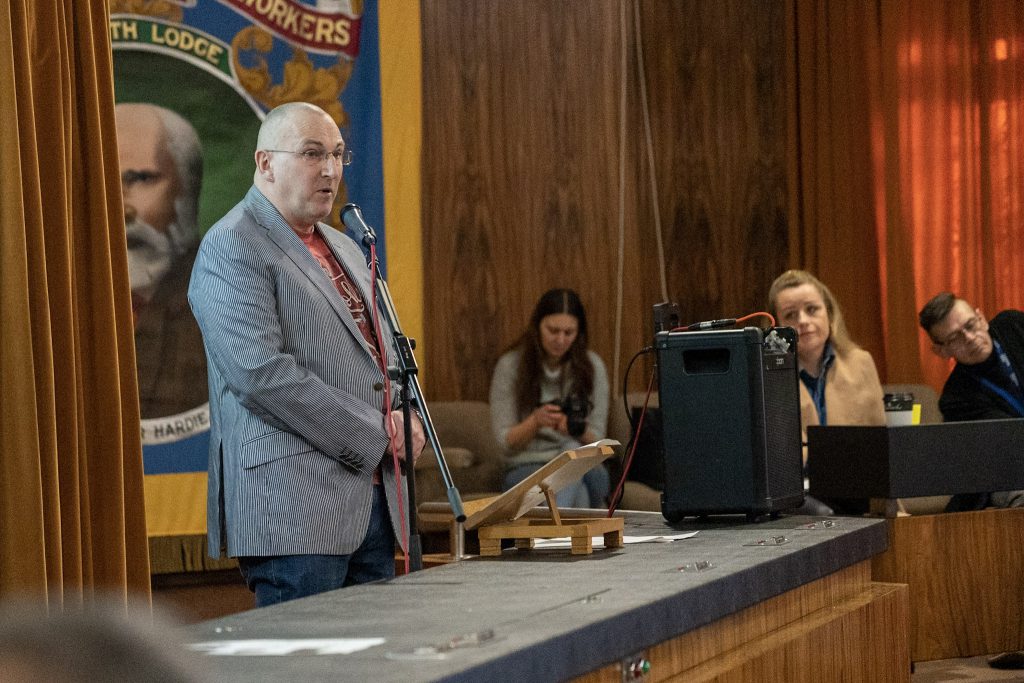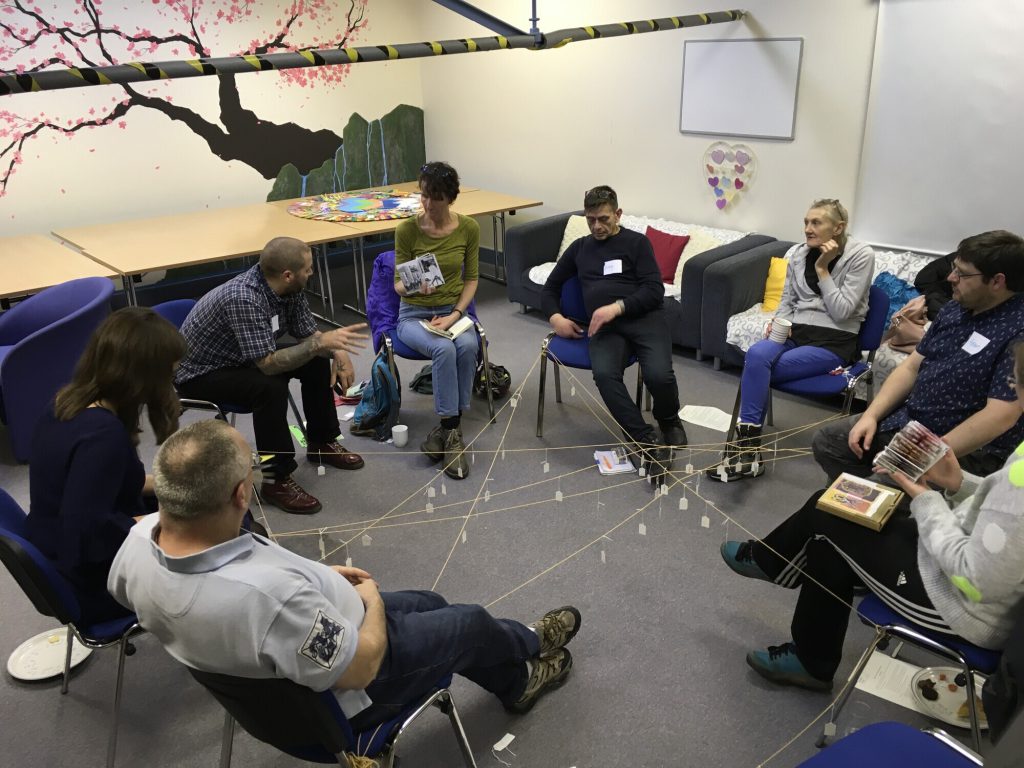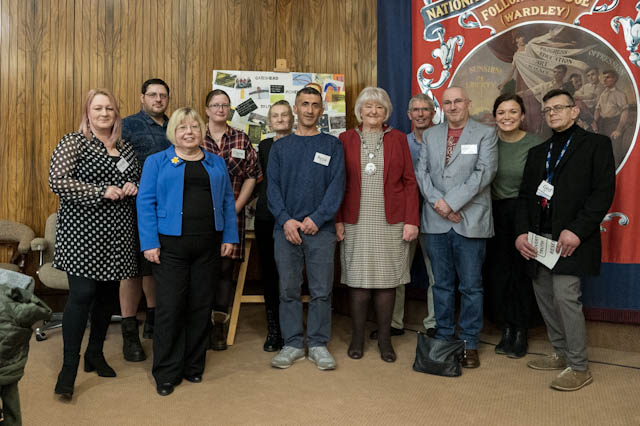The Gateshead Poverty Truth Commission: Sharing the lived experience of poverty
Published 2 September, 2021
Lucy Zwolinska, Ged Hazlehurst & PJ the Poet
The Gateshead Poverty Truth Commission
How can the lived experience of poverty help inform our understanding of the challenges people face in low-income urban areas? Lucy Zwolinska, Coordinator and Facilitator of the Gateshead Poverty Truth Commission, discusses how their organisation is establishing supportive communities to listen and learn from those who have experienced poverty first-hand.
A short poem by PJ the Poet, Commissioner at the Gateshead Poverty Truth Commission, sheds a creative light on some of the conditions associated with poverty in Gateshead, United Kingdom:
In the Borough of Gateshead, the percentage of residents who either live off, or are topped up by benefits, is 60%, one of the highest in the UK… This is the Borough the 60% live, In Tower block and terraced row, home to their estate they go, past empty shops, except for a few, Fast food, cheap booze and a pawn broker or two. This is the Borough the 60% live. Under 25 unemployment is rife ,no job for life, but for some they call it work. The wage is minimum, the contract… zero hour, its not easy to feel empowered. This is the Borough the 60% live Wearing knock off trainers, and cheap as chips clothes, this is our style code, no celeb endorsing, no dignifying in benefit mode. This is the Borough the 60% live, The leccie is on a key, the phone as you go, you budget to eat when the assistance is low. And they want you to stretch and grow. This is the Borough the 60% live, here we have all the Ts, community, charity, hilarity, and food bank tea, no one here is along for a free ride. This Borough still has pride. PJ the Poet, April 2021

Understanding experiences of poverty
At Gateshead Poverty Truth Commission, because we are made up of people who experience poverty, we understand the way homelessness, addiction and a housing crisis exacerbates or even creates ill-health.
The Poverty Truth Commission in Gateshead is part of a network of Poverty Truth Commissions across cities in the UK. Each commission is made up of both people who have a lived experience of poverty, and leaders within the city or region. Collectively, the Commission, work to understand the nature of poverty, exploring some of the underlying issues that create poverty and explore creative ways of addressing them.
The option between putting food in the fridge or paying for gas and electricity is a reality for many in our community, impacting people’s ability to access services, employment and participate in society.
In cities where making a living wage determines our ability to function in society, the lack of well paid work serves to exacerbate and reinforce cycles of poverty.
Not only does economic insecurity impact people’s ability to meet their basic physical needs in terms of employment, housing and health care, economic isolation contributes to social exclusion.
Imagine being isolated in the middle of a town or city because we can’t afford to go for a coffee, or even meet our friends because our situation creates a situation where our health – mental or physical – isn’t good enough for us to go out.
The city is a place where the structural determinants of poverty meet the social impacts of poverty. Ultimately, as experiencers of poverty, it often feels like everything is working against us.
Support through community
But we also know what it is like to belong. To be in a community where people help each other out, where everyone is looking out for their neighbour. Establishing supportive communities can serve to lessen the impacts of isolation for people experiencing poverty.
Social networks can be places of support, where access to information, support and advice can help people manage their economic and social difficulties. In cities that primarily recognize us for our economic value, creating sustainable urban communities should also take into consideration the social effects of poverty.

We also are starting to learn what it’s like to be listened to.
As people who have experienced of poverty first hand, we’ve begun meeting with people who hold power and influence in Gateshead. We are telling our stories and building relationships and also beginning to make changes to the way that Gateshead’s present and future is being shaped. The Commission meet regularly to discuss experiences of poverty in their area, working with local communities, organisations and institutions, and holding public events as a way to communicate about poverty and influence policy.
In our work with a local social housing provider we are working to start leaving in good quality soft furnishings instead of taking them out when the tenants change. The current policy of ripping them out regardless of the quality means more than one of us in the Commission lives without carpets or curtains. Throughout this change-making we’re ensuring that the voices that are usually not listened to – those of us that experience this stuff – are part of the change-making process. It’s only because the housing provider was listening to what matters to us that they realized that this policy needs to change.
Experience informing policy
We’re also getting involved with academic research. New academic research between North-East and Scottish Universities is exploring the links between mental health and Universal Credit. Two of our members have first-hand experience of this so instead of just being interviewed about this, we’re actually helping to write the research questions and guide the inquiry.
When the UK Cabinet Office consulted with regions in the North East of England about how to go about unlocking after Covid-119 restrictions, Gateshead Public Health decided that instead of sending officials and the charity sector, they would invite our members to take part in that conversation. As a result we were able to share issues that are impacting us directly and that we know were being overlooked: the impact of shielding on those who are caring for people with disability; the issues of not having good public transport across our sprawling urban areas to get to vaccination centres; the problem of distrusting the institutions that are claiming to want to help because they’ve let us down before.

We think that some solutions to poverty are simple whilst others are complex. But all solutions require really deep listening, understanding, time and thought. For real lasting change to happen it is imperative that the people at the sharp end of poverty are involved in finding those solutions and informing the policies that shape urban development. The expertise we have can’t be taught, it has to be lived. And we’ve lived it.
As we are shaped by our relationships with our community and with the people of influence in Gateshead who are listening to us, we in turn are making change – change for individuals, change for communities, change for the future of Gateshead.
Lucy Zwolinska, Ged Hazlehurst & PJ the Poet
August 2021
About the authors and the feature
This article was written by the Gateshead Poverty Truth Commission team. Lucy Zwolinska, Coordinator and Facilitator, Commissioner Ged Hazlehurst and PJ the poet and commissioner.
The Gateshead Poverty Truth Commission exists to ensure that people who have experienced poverty first-hand are at the heart of how Gateshead thinks and acts in tackling poverty and inequality. The commission works together with local authorities, organisations, and local communities to communicate around experiences of poverty and influence policy directed at tackling poverty.
Share
Co-creation!
Do you miss something here? Would you like to contribute? Please let us know: urbanfutures@slu.se
